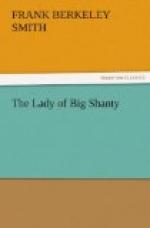During this enforced exile he had developed both the shyness and the daring of an animal. With him it had become an instinct, when he moved far, or in a dangerous locality, to travel by night—like the panther, whose tracks though rarely seen by others, he often found in his wanderings. When he was forced to take to the woods by day, he either proceeded cautiously or slept. Both his hearing and his eyesight having become acute, he saw and heard with the alertness of a fox, and lived as free—a cruel freedom that became a mockery. He had no clothes save the makeshifts he stood in. When it rained he remained soaking wet, like the ground and the trees about him; he became one of them, drying when they did; drenched, frozen or warmed at the will of the weather. He no longer spoke; he became silent like the things about him—when his own voice escaped him it startled him.
Yet even in his isolation he made friends: the cave that sheltered him; the tree whose rotten core always burned for him under his flint and steel; some pure, unfailing spring,—all these had for him a certain dumb comradeship.
And now to be fed and warmed at the same time! To be eating no longer alone, crouched in the dark like a hungry lynx, often in the drenching rain, or hidden under the cold roof of some rock; but among human beings whom he did not fear, men and women who spoke to him kindly and gave him the best they had in their own misfortune. To meet again Billy and Freme; to feel the friendly pressure of the old dog’s head upon his thin knees; to be within sight once more of a snug, dry lean-to ready to rest his tired body. These were mercies he had never thought to see again. Yet, thankful as he was for them, they were secondary to his silent joy at seeing his father.
Occasionally the old man spoke to him in a low tone, as he piled the freshly cut night wood beside the fire. In reply the outcast either nodded or shook his head. When he had finished eating—and he ate ravenously—he rose, went over to Thayor, and laying his hand timidly on his arm, motioned him aside.
“I’ve got something to say to ye, Mr. Thayor,” he whispered. “That’s what I come for; I’d like to talk to ye now.”
Thayor nodded and, turning to the others, said:
“Mr. Dinsmore and I have a little matter to talk over.”
At last the two had met face to face—this man who, try as he would to banish him from his mind, always rose before him: in the dead of night; before his fire in his own room at home, his wife out at some social function or asleep on the floor below him; in his walks through the woods when he would stop and listen, hoping he might again see the same, worn, shambling figure he had watched from across the brook the day he shot the buck. Why, he could not tell. Perhaps it was because of their mutual loneliness. Perhaps it was because of a woman. Whatever the cause there was something which seemed to link them together.




